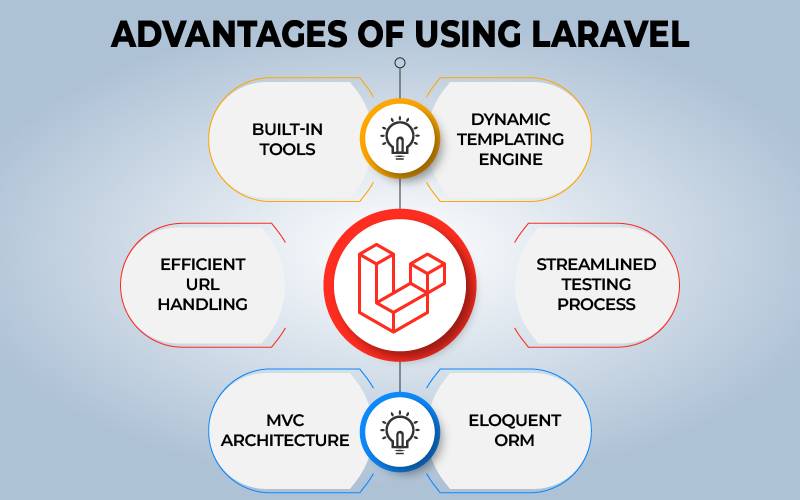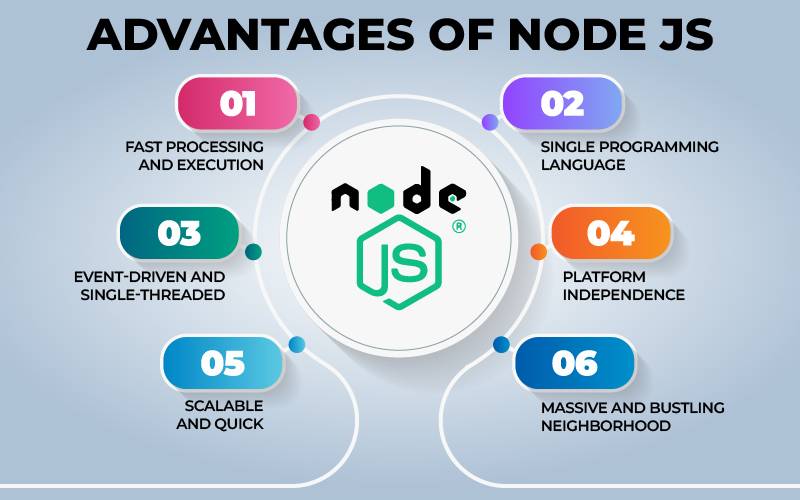Laravel vs Node.js: A Clear Guide to Web Framework Choices
When making a comparison of laravel vs node.js, we’re looking at two powerful players in the world of web development, each with its own unique strengths and philosophies. Laravel, a PHP framework, is renowned for its elegant syntax, robust features, and a strong focus on developer productivity and backend architecture.
It’s particularly favored for traditional web applications and complex backend systems. On the other hand, Node.js, not a framework but a JavaScript runtime, excels in building fast, scalable, and real-time applications, often preferred for its performance in handling concurrent processes and its full-stack potential with JavaScript.
Overview of Laravel
Laravel is a free, open-source PHP web framework used for web application development. It follows the model-view-controller (MVC) architectural pattern, providing tools and resources to build modern PHP applications.
Laravel simplifies web development with PHP by offering a well-structured and feature-rich platform. It includes built-in support for database management, user authentication, routing, and session handling. Laravel’s ORM (Object-Relational Mapping) system, Eloquent, allows for easy interaction with databases.
The Blade templating engine enhances the process of creating dynamic web pages. With extensive documentation and a supportive community, Laravel is suitable for both beginners and experienced developers looking to streamline their web development process.
Overview of Node.js
Node.js is an open-source, cross-platform JavaScript runtime environment. It enables the execution of JavaScript code outside a web browser. Node.js is designed for building scalable network applications and is known for its efficiency and lightweight nature.
Node.js revolutionizes backend development by using JavaScript, traditionally a client-side language. It’s built on Chrome’s V8 JavaScript engine, ensuring fast code execution. Node.js features an event-driven, non-blocking I/O model, making it ideal for data-intensive, real-time applications across distributed devices.
It supports asynchronous programming, contributing to its efficiency in handling multiple simultaneous operations. With a vast package ecosystem, npm (Node Package Manager), Node.js offers a rich library of modules, simplifying various development tasks. This makes it a popular choice for developers looking to build fast, scalable network applications.
Can Laravel vs Node.js coexist in the same project?
Yes, Laravel and Node.js can coexist in the same project. It’s common to see Laravel used for the main backend API and administration panel, while Node.js handles specific real-time functionalities or microservices. This hybrid approach allows leveraging the strengths of both technologies.
Advantages of Using Laravel
- Built-in Tools: Laravel comes with a suite of tools that simplify common tasks in web development, enhancing productivity and efficiency.
- Dynamic Templating Engine: Laravel’s Blade templating engine is intuitive and flexible, allowing for easy creation of dynamic web pages with minimal effort.
- Efficient URL Handling: Laravel provides a clean, simple API for defining URL routes, ensuring easy navigation and URL management in applications.
- Streamlined Testing Process: The framework supports automated testing, making it easier to maintain high-quality code throughout the development process.
- MVC Architecture: Laravel follows the Model-View-Controller pattern, promoting clean separation of concerns which improves the organization and manageability of code.
- Eloquent ORM: This Object-Relational Mapping tool simplifies interaction with databases, allowing for more expressive and easier-to-understand database queries.
Disadvantages of Using Laravel
- Learning Curve: Laravel’s advanced features and functionalities can be challenging for beginners, requiring time to master.
- Performance Overhead: Due to its many features and functionalities, Laravel can sometimes have a performance overhead compared to lightweight frameworks.
- Limited Built-in Support for Microservices: While Laravel is substantial for traditional applications, it may lack built-in support for microservices architecture.
- Upgrading Challenges: Upgrading Laravel to the latest version can be complex, especially for large applications with many dependencies.
- Lightweight: Contrary to being lightweight, Laravel’s comprehensive nature can sometimes add extra load and complexity to projects.
- Library Quality: The quality of third-party libraries in Laravel varies, which may impact the overall stability and reliability of the application.
Key Characteristics of Laravel
- Synchronous Operation Style: Node.js’s asynchronous operation style not only handles multiple connections efficiently but also greatly reduces the likelihood of server bottlenecks, making it ideal for high-traffic websites and applications.
- JavaScript Construction: This unified JavaScript development approach in Node.js eliminates the need for context switching between languages, streamlining the development process and fostering better collaboration between frontend and backend teams.
- Linear Execution Approach: Node.js’s linear approach not only simplifies the development process but also contributes to more predictable and manageable code, particularly beneficial for developers new to asynchronous programming.
- Multi-Platform Compatibility: This compatibility ensures that Node.js applications can be easily ported across various environments, simplifying the deployment process and reducing overhead costs associated with cross-platform development.
- Non-Blocking A synchronicity: Beyond real-time applications, this feature also greatly enhances the user experience in data streaming and handling API requests, providing smoother and more responsive interactions.
- Uni-Threaded Architecture: While it streamlines development, Node.js’s architecture also means lower resource usage compared to multi-threaded systems, resulting in more efficient performance even on lower-specification servers.
- Object-Centric Design: Node.js’s object-oriented programming capability not only aids in code organization but also enhances code reusability and scalability, key factors in maintaining large-scale applications.
- Platform-Agnostic Development: This trait of Node.js not only reduces development time but also ensures that applications remain consistent across different platforms, crucial for the modern, diverse computing landscape.
Advantages of Node JS
- Fast Processing and Execution: Node.js is built on Google Chrome’s V8 JavaScript engine, enabling it to execute code very quickly, which is crucial for performance-intensive applications.
- Single Programming Language: Node.js allows developers to use JavaScript on both the client and server sides, facilitating a more unified and efficient development process.
- Event-driven and Single-threaded: It uses a non-blocking, event-driven architecture, making it efficient in handling concurrent requests without the overhead of multiple threads.
- Platform Independence: Node.js is cross-platform, running seamlessly on Windows, Linux, and macOS, which offers great flexibility in development and deployment environments.
- Scalable and Quick: Its lightweight and efficient approach, especially in handling I/O operations, makes Node.js highly scalable, suitable for handling high traffic applications.
- Massive and Bustling Neighborhood: Node.js has a large, active community, providing a wealth of modules and libraries through npm and continuous improvements and support.
Disadvantages of Using Node JS
- Asynchronous Execution Approach: Node.js operates asynchronously, which can make the flow of code harder to follow and manage, especially in complex applications.
- Circuit Formulation: This refers to the organization of code and logic pathways in Node.js, which can be challenging due to its event-driven nature.
- Inadvisable for CPU-Heavy Tasks: Node.js is not optimized for tasks that require intensive CPU computation, as its single-threaded model can lead to performance bottlenecks.
- Evolving API Landscape: The APIs in Node.js are frequently updated, leading to potential instability and the need for developers to continuously adapt their code.
- Heavy Computational Tasks: Handling long-running, CPU-intensive operations in Node.js can be inefficient, affecting the application’s overall performance.
- Callback Hell: This is a situation where nested callbacks become complex and difficult to manage, often occurring in Node.js due to its reliance on asynchronous code execution.
Is Laravel a more secure programming language than Node.js?
Laravel (PHP framework) vs Node.js
(JavaScript runtime) themselves are not inherently more or less secure than one another. Security depends largely on how the application is developed and maintained. Laravel offers reliable built-in security features, while Node.js’s security relies on best practices and secure coding in JavaScript along with secure modules.
Key Characteristics of Node.js
- Asynchronous Operation Style: Node.js optimizes web application performance with its asynchronous operation style, enabling tasks to run independently without blocking each other, which is especially useful for handling numerous simultaneous connections.
- JavaScript Construction: The use of JavaScript for both server-side and client-side scripting in Node.js provides a unified development experience, making it easier for developers to transition between frontend and backend work.
- Linear Execution Approach: Node.js’s linear execution model streamlines development processes, reducing complexity and increasing the speed of development cycles.
- Multi-Platform Compatibility: Its compatibility across diverse platforms makes Node.js a versatile tool, facilitating consistent development experiences and reducing the need for platform-specific adjustments.
- Non-Blocking Asynchronicity: This feature of Node.js is particularly beneficial for applications that require real-time data processing, such as chat applications and online gaming platforms.
- Uni-Threaded Architecture: Node.js’s single-threaded architecture simplifies the development process and enhances application performance, particularly in handling high volumes of short-duration requests.
- Object-Centric Design: Emphasizing an object-oriented approach, Node.js allows for more organized and modular code, making it easier to maintain and develop complex applications.
- Platform-Agnostic Development: The ability to develop applications on one platform and deploy them on others without significant changes is a significant advantage of Node.js, reducing development time and costs.
Laravel Vs Node js
| Laravel | Node js |
|---|---|
| Programming Language | Programming Language |
|
|
| Performance Metrics | Performance Metrics |
|
|
| Community Support and Resources | Community Support and Resources |
|
|
| Learning Curve for Developers | Learning Curve for Developers |
|
|
| Package Ecosystem and Module Availability | Package Ecosystem and Module Availability |
|
|
| Database Integration and Support | Database Integration and Support |
|
|
| Built-in Security Features | Built-in Security Features |
|
|
| Typical Use Cases for Each Technology | Typical Use Cases for Each Technology |
|
|
| Development Productivity and Efficiency | Development Productivity and Efficiency |
|
|
| Integration with Front-end Technologies | Integration with Front-end Technologies |
|
|
Conclusion
In conclusion, the Laravel vs Node.js debate hinges on specific project needs and team expertise. Laravel shines in building complex backend systems with its comprehensive PHP framework, offering a rich set of functionalities for traditional web applications.
Node.js, leveraging JavaScript, excels in creating high-performance, real-time applications, and is preferred for projects requiring scalability and speed. Both frameworks boast strong community support and continual development, making them reliable choices in the evolving web development landscape.
Ultimately, the choice between Laravel and Node.js should align with your project’s requirements, the technical strengths of your team, and the long-term goals of your application. This decision is not about finding the ‘best’ framework, but rather the most suitable one for your specific needs.
Frequently Asked Questions
Q1: What factors should I consider when choosing Laravel vs Node.js in 2024?
A: In choosing between Laravel and Node.js in 2024, consider Laravel for complex backend systems due to its reliable PHP ecosystem, while Node.js excels in high-performance, real-time applications with its JavaScript-based environment. Node.js offers superior scalability, especially for concurrent requests. The decision also depends on your team’s expertise in PHP or JavaScript and the level of community support for each framework.
Q2: Which language is used in Laravel and Node.js?
A: Laravel is a PHP framework, so it uses PHP. Node.js is a runtime environment for executing JavaScript on the server side.
Q3: Which one is better for building RESTful APIs, Laravel, or Node.js?
A: Both are capable of building secure RESTful APIs. Laravel provides elegant syntax and tools like Eloquent ORM for easy database interaction. Node.js, with frameworks like Express.js, offers a more flexible and lightweight approach. The choice often depends on the specific needs of the API and the familiarity of the development team with PHP or JavaScript.
Q4: Which one is better for real-time applications, Laravel, or Node.js?
A: Node.js is generally preferred for real-time applications due to its non-blocking I/O model, which allows it to handle many connections simultaneously. This is particularly beneficial for chat applications, live streaming, and online gaming.
Q5: Is Laravel or Node.js more performant in 2024?
A: As of 2024, Node.js typically offers higher performance, especially in handling concurrent connections and real-time data, due to its event-driven architecture. However, Laravel has also been optimized significantly over the years and can be quite performant for many web applications.
Q6: Which framework has better community support, Laravel, or Node.js?
A: Both Laravel and Node.js have strong community support. Node.js, being part of the broader JavaScript ecosystem, might have a larger community. Laravel also boasts a stable and active community, especially among PHP developers.
Q7: Which framework has better scalability, Laravel, or Node.js?
A: Node.js generally offers better scalability due to its non-blocking architecture, making it easier to handle a large number of simultaneous connections, which is essential for large-scale applications.
Q8: Which framework is better for beginners, Laravel, or Node.js?
A: For beginners, Laravel might be more approachable due to its comprehensive documentation, built-in functions, and a more straightforward learning curve. Node.js can be more challenging initially due to its asynchronous nature and JavaScript intricacies.
Q9: Which framework has better security measures, Laravel, or Node.js?
A: Both frameworks provide substantial security features. Laravel has built-in security features like protection against cross-site request forgery (CSRF) and SQL injection. Node.js security depends more on the practices followed and the modules used.
Q10: Are there any notable projects or companies using Laravel or Node.js in 2024?
A: As of 2024, many notable companies use both Laravel and Node.js. Laravel is popular among content management systems, e-commerce platforms, and enterprise applications. Node.js is widely used by tech giants for real-time services, streaming platforms, and social media applications.















